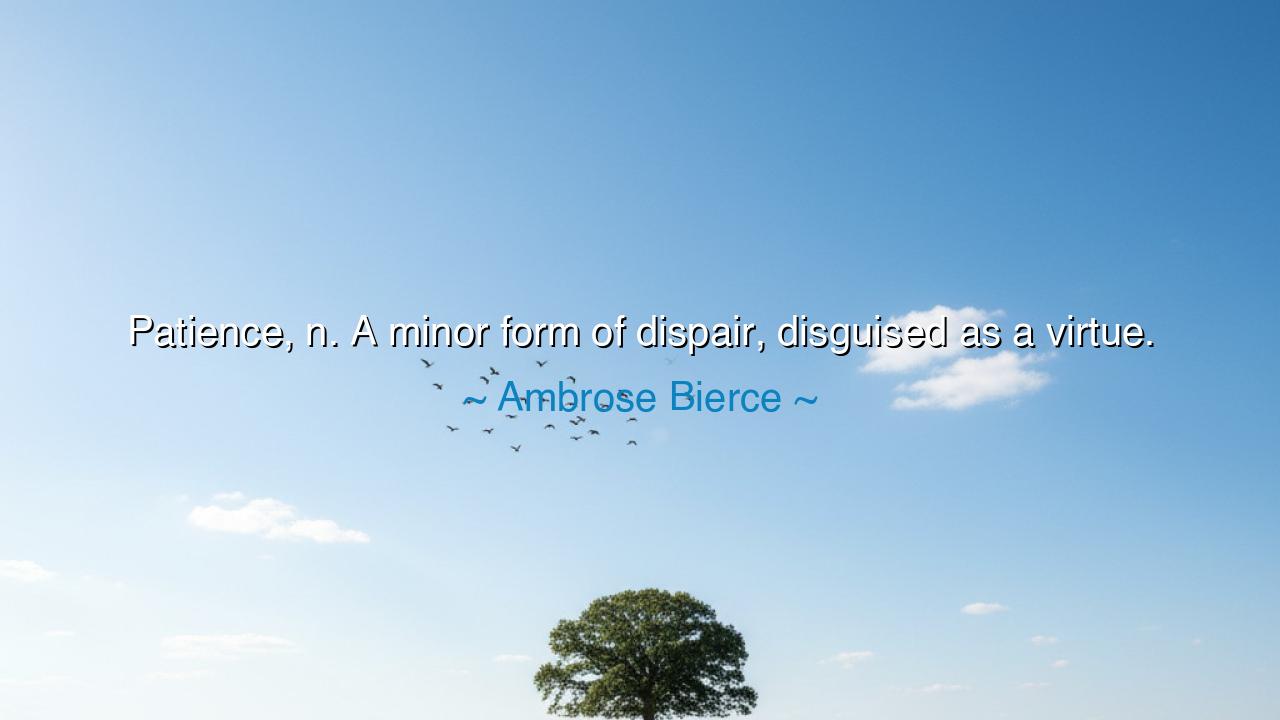
Patience, n. A minor form of dispair, disguised as a virtue.






Hear the biting words of Ambrose Bierce, the dark satirist of America, who in his Devil’s Dictionary wrote: “Patience, n. A minor form of despair, disguised as a virtue.” Unlike the saints and sages who praised patience as holy endurance, Bierce mocked it as the mask of resignation, the quiet sigh of those too weary or powerless to act. In his cynicism, he stripped away the gilded robe of virtue and revealed what he saw as its hidden face—despair dressed in noble garments. His words sting because they strike at the tension between waiting in hope and waiting in futility.
The origin of this thought lies in Bierce’s own life and the bitter philosophy he carried. A soldier in the brutal American Civil War, he saw men waiting in trenches, “patiently” enduring orders that led only to slaughter. Later, as a journalist, he witnessed corruption, greed, and injustice, and observed that those who counseled patience often meant, “Do nothing, accept your chains, and wait while the strong feast.” To Bierce, patience was less the virtue of the strong and more the disguise of the defeated, a surrender dressed in the language of dignity.
History provides examples that echo his view. Consider the serfs of medieval Europe, told by lords and priests alike to endure poverty with patience, for their reward awaited them in heaven. This “virtue” often meant submission, keeping the masses docile while their labor enriched the powerful. To a spirit like Bierce’s, such patience was nothing more than despair, the extinguishing of hope for change, sanctified by those who profited from it. His definition, sharp and scornful, unmasks this darker side of a virtue too easily praised.
And yet, the ancients themselves were not blind to this duality. Even the Stoics, who praised endurance, warned against confusing patience with weakness. Marcus Aurelius spoke of enduring what cannot be changed, but also of acting decisively when action is possible. To wait where one could rise, to endure where one could resist, is not true virtue—it is defeat. Bierce’s words, though cynical, remind us that patience without discernment can indeed rot into despair, cloaked in self-deception.
Consider also the story of the early suffragettes. For centuries, women were told to wait patiently, to trust that their rights would come in due time. Yet such waiting yielded nothing. Only when they rejected passive patience and demanded action—marching, protesting, and suffering imprisonment—did the world begin to change. Bierce’s words ring here with truth: had they clung to the “virtue” of patience, they would have remained forever in chains. It was the refusal of disguised despair that won their freedom.
What lesson then must we take from Bierce’s hard saying? It is this: test the patience you practice. Ask whether it springs from strength, from the wisdom to endure what must be borne—or from despair, the weary belief that nothing can ever change. Patience can be noble, but it can also be poison when it numbs the will to act. The true virtue is not blind waiting, but wise waiting, joined always with courage to rise when the time is right.
Therefore, let your actions be thus: do not discard patience, but wield it with discernment. Endure hardship when endurance builds strength, but never let “patience” be the excuse for submission to injustice. Ask yourself, “Am I waiting because it is wise—or because I am afraid?” If the answer is despair, then cast it off and act. For as Bierce, with his dark wit, reminds us: sometimes what the world calls patience is merely despair in disguise—and to live nobly is to know the difference.






AAdministratorAdministrator
Welcome, honored guests. Please leave a comment, we will respond soon